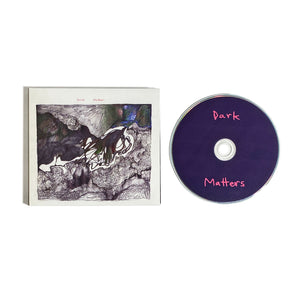Your Cart is Empty





SL-097
Release date:
March 11, 2022
Maneka - Dark Matters
$ 10.00 - $ 22.00
Purchase includes instant full-album download.
Devin McKnight makes music to be understood. With Maneka, his wildly adventurous songwriting project, the Brooklyn-based indie rock artist has consistently and thoughtfully explored the fringes of identity. As a Black man, he writes songs that resiliently navigate the anxiety of being a minority in largely white spaces, offering solidarity to outsiders everywhere and firm defiance against a regressive status quo. OnDark Matters, the masterful second Maneka album out March 11, 2022 via Skeletal Lightning, McKnight is at his most clear-eyed and searching. Across 10 tracks, McKnight asks uncomfortable questions about himself and America’s dark past all while scraping the edges of what guitar music can be. Kinetic, unpredictable, and totally resonant, this LP is a triumphant window into McKnight’s vision.
Maneka started as an outlet for McKnight to immerse himself in producing his own music after several stints as a sideman touring with other bands. “I had this big idea to be forging ahead with creating a space for black people in rock music,” says McKnight. His first effort 2017’sIs You IsEP was abrasive, scrappy, and endlessly listenable complete with songs aboutThe O.C.and an outro featuring his parents talking about their childhood growing up in segregated America. This juxtaposition of McKnight’s own personality and upbringing against years of generational trauma, gentrification, and injustice served as the backdrop for his explosive 2019 debut LPDevin. Earning praise for Bandcamp and Afropunk, the album solidified McKnight as one of the most essential voices in rock music.
Dark Mattersis the result of McKnight’s hard-earned confidence as a frontman and lyricist. “The first record maybe it was a little bit of that like I was afraid to really show all my cards and the second one I got to dig a little deeper, but this one feels like it’s what I’ve truly been going for,” says McKnight. WhereDevinhoned in on overt things that McKnight was experiencing, he approached this record with a bird’s eye view drawing from subjects as big picture as American history and even the cosmos. “There's a lot about being a racial minority in this country, in general, that kind of ends up in the cracks,” says McKnight. “There are stories that get literally thrown out or explained away or hurt too much to talk about: the Tulsa massacre, sundown towns, etc.” Though these historical realities are tossed aside for sanitized narratives, there’s power and necessity in their retelling.
As McKnight learned more about the largely forgotten horrors of American racism, he battled insomnia and took to binging space documentaries on streaming services to calm his brain. During a film on Dark Matter, McKnight had a revelation. “With dark matter, it’s there but it’s not: Just like our history with race,” says McKnight. “A lot of people are aware of its existence, but you can't touch it. You can't smell it. But it's among us. America has this really dark energy. How has it been this fucked up for this long and no one's done anything about it?” This question is the foundation of these 10 tracks, songs that sometimes violently shift in tone like the piercing, synth-heavy intro track, the cinematic “Maintain” or the gauzy “Zipline.”
The first song he wrote forDark Mattersis the single“The Glow Up.” Over hypnotically pummeling guitars, McKnight sings, “And how do you explain this? / The seat in the back is meant for me? / And how do you explain this? / The ones we lost hanging from the trees / They don't want to see you shine.” The soaring track takes just as many cues from Duster and Alex G as it does Young Thug.“ Even if you have wealth or a good family, the racist culture just knocks you back down a peg,” says McKnight. “Every black person I know has a story like this somewhere. It's infuriating because it set us back generations. I wanted to juxtapose vague sad boy rock with themes that are actually worth being sad about.” On the quiet stunner “Runaway,” delicate acoustic guitars anchor McKnight singing, “and for five centuries / you would have been right / to flee this town before / Sundown.”
McKnight explains, “I wanted to introduce the idea of indie rock fused with gaudy bejeweled blackness. We’re not ashamed of our success, we’re flaunting it.“ OnDark Mattershighlight “Winner’s Circle,” he playfully toys with this and the radical idea that Beethoven was actually Black. He raps, imagining telling him: “Play that brand new shit / That No. 9 shit homie. / You the dope lil homie / And you don't even know it. / It's about pride in the fact that you shine on em” over dirge-like bass and synths. “I don't care whether or not it's true whether Beethoven was Black or not but if it’s true, he wore a white face to fit in so that people wouldn't know that he had a darker complexion,” says McKnight. “This is me confronting that: I was just talking to Beethoven as if he's just some dude from around the way that I recognize and telling him to be proud of who you are.”
OnDark Matters, the record sounds fantastic. Engineered and mixed by longtime friend and collaborator, Mike Thomas as well as mastered by Beauty Pill’s Chad Clark, the record boasts his longtime drummer Jordan Blakely, as well as a wealth of collaborators like V.V. Lightbody and Chicago polymath NNAMDÏ, who drums on two standout jazz freakouts “Jazz with Nnamdi.” Closer “Bluest Star,” sums up a record with a bitter and nostalgic look at a lost friend. “Blue Stars are stars that get so big and so hot they burn out really fast and they also suck the energy out of all the other stars around them,” says McKnight. Over frenetic guitars, he sings a kiss-off: I was the one who walked away / And made it out. / I grew a rocket and some wings / And I drew a crowd without you.”
This statement of defiance and strength against adversity is the main thread ofDark Matters. “Learning about this history made me think a little bit more about how much I didn't know about myself and where I come from,” says McKnight. “Trying to place myself in this history and my own place in the universe was what I was trying to accomplish with this record. These lyrics are way more personal even if they're talking about these things from the past.” - Josh Terry
You may also like
x





